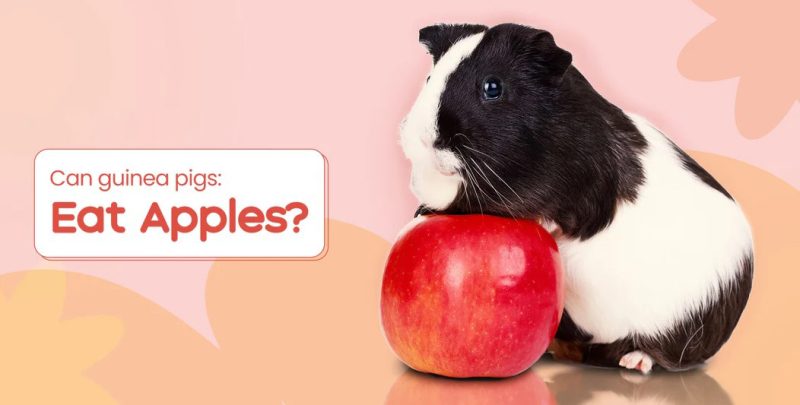Guinea pigs are adorable, friendly pets that require a well-balanced diet to stay healthy and happy. As pet owners, we often want to give our guinea pigs treats, but we must be cautious about what foods are safe for them to eat. One common question that arises among guinea pig owners is: “Can guinea pigs eat apples?”
In this detailed guide, we’ll answer that question and explore everything you need to know about feeding apples to guinea pigs. From the benefits of apples to potential risks, you’ll learn how to incorporate this fruit into your guinea pig’s diet safely.
Why Is It Important to Know What Guinea Pigs Can Eat?

Before we dive into whether guinea pigs can eat apples, it’s essential to understand why choosing the right foods is important. Guinea pigs have very specific dietary needs, and feeding them the wrong foods can lead to health issues like obesity, digestive problems, or even life-threatening conditions. As herbivores, guinea pigs rely on fresh hay, vegetables, and fruits to get the nutrients they need.
Knowing which foods are safe, which foods should be avoided, and how to properly introduce new items into their diet is critical for their overall well-being. Apples are a popular fruit, but it’s important to understand whether this treat is safe and how much to feed them.
Can Guinea Pigs Eat Apples? Yes, But in Moderation
The simple answer to the question is: yes, guinea pigs can eat apples. Apples are non-toxic and contain beneficial nutrients that can support your guinea pig’s health. However, there are some important considerations when feeding apples to guinea pigs, and it’s crucial to follow guidelines to ensure your pet remains safe.
What Are the Nutritional Benefits of Apples for Guinea Pigs?
Apples offer several nutritional benefits that can be beneficial for guinea pigs when fed in moderation. Here are some of the key nutrients found in apples:
1. Vitamin C
Guinea pigs, unlike humans, cannot produce their own vitamin C, which means they need to get it from their diet. Apples contain small amounts of vitamin C, which can help support your guinea pig’s immune system and prevent scurvy. However, apples should not be relied upon as the primary source of vitamin C—other vegetables like bell peppers or leafy greens should be the main sources.
2. Fiber
Fiber is essential for guinea pigs’ digestive health. Apples contain both soluble and insoluble fiber, which help maintain regular digestion and prevent gastrointestinal problems. The fiber in apples can contribute to a healthy gut and promote proper bowel movements.
3. Antioxidants
Apples are rich in antioxidants, particularly flavonoids and polyphenols, which can help combat oxidative stress and promote general well-being. These antioxidants may help reduce inflammation and promote a healthy immune system in guinea pigs.
4. Hydration
Apples have a high water content, which can help keep your guinea pig hydrated. This is especially useful in hot weather when dehydration can be a concern for small pets. Hydration is critical for your guinea pig’s overall health and digestive function.
How to Safely Feed Apples to Your Guinea Pig
While apples can be a healthy treat for guinea pigs, it’s essential to know how to feed them properly. Here are some tips for safely introducing apples to your guinea pig’s diet:
1. Remove the Seeds and Core
Apple seeds contain cyanide, a toxic substance that can be harmful to guinea pigs if consumed in large quantities. Therefore, always remove the seeds and the core of the apple before offering it to your guinea pig. The flesh of the apple is safe, but the seeds can cause serious health issues.
2. Cut the Apple into Small Pieces
Guinea pigs have small mouths, so cutting the apple into small, manageable pieces is essential. This will make it easier for them to eat and prevent choking. Small slices also help control portion sizes, ensuring you don’t overfeed your guinea pig.
3. Offer Apples in Moderation
Although apples are healthy, they are high in sugar, which can lead to weight gain and other health problems if given in excess. It’s important to feed apples as an occasional treat rather than a regular part of their diet. A small slice or two a few times a week is typically sufficient.
4. Wash the Apple Thoroughly
To remove pesticides, waxes, or other chemicals that may be present on the apple’s skin, always wash the apple thoroughly before offering it to your guinea pig. If possible, choose organic apples to reduce the risk of pesticide exposure.
Potential Risks of Feeding Apples to Guinea Pigs
Although apples can be a safe and healthy treat when fed properly, there are some potential risks to keep in mind. Here are some of the most common risks associated with feeding apples to guinea pigs:
1. High Sugar Content
Apples are naturally sweet, and their sugar content can be a concern for guinea pigs. Too much sugar in their diet can lead to obesity, diabetes, or digestive issues. It’s important to feed apples sparingly and balance their intake with other healthy foods like hay, leafy greens, and vegetables.
2. Risk of Choking
If the apple is not properly cut into small, manageable pieces, there’s a risk that your guinea pig could choke on a large piece. Always ensure that the pieces are small enough for your guinea pig to handle easily.
3. Diarrhea or Stomach Upset
Introducing new foods to your guinea pig’s diet too quickly can upset their digestive system. If your guinea pig is not used to eating apples, start with small portions and observe for any signs of diarrhea or stomach upset. If your guinea pig has a sensitive stomach, apples may not be the best treat for them.
4. Overfeeding Can Lead to Imbalanced Diet
While apples provide some beneficial nutrients, they shouldn’t replace other more essential parts of your guinea pig’s diet. Overfeeding apples can cause an imbalance in their nutrition, particularly with their fiber and vitamin C intake. Ensure that their main diet consists of high-quality hay, fresh vegetables, and limited fruits like apples.
Other Safe Fruits for Guinea Pigs
Apples are not the only fruit that guinea pigs can enjoy. In moderation, many fruits can be a great addition to their diet. Here are some other fruits that guinea pigs can safely eat:
- Pears (without seeds)
- Strawberries
- Blueberries
- Watermelon (without seeds)
- Peaches (without pits)
- Kiwi
- Papaya
Always introduce new fruits slowly and in moderation, and remove any seeds or pits before feeding them to your guinea pig.
Conclusion: Can Guinea Pigs Eat Apples?
Yes, guinea pigs can eat apples, but they should be given in moderation and prepared properly. Apples offer beneficial nutrients like vitamin C, fiber, and antioxidants, making them a healthy treat when fed in small quantities. However, you should always remove the seeds and core, wash the apple thoroughly, and cut it into small pieces to prevent any health risks.
Keep in mind that apples are high in sugar, so they should not be a regular part of your guinea pig’s diet. Instead, focus on providing a balanced diet of hay, fresh vegetables, and occasional fruit treats to keep your guinea pig healthy and happy. Always observe your guinea pig after introducing new foods to ensure they are tolerating them well.
By following these guidelines, you can safely include apples in your guinea pig’s diet and offer them a delicious treat that supports their overall health.






